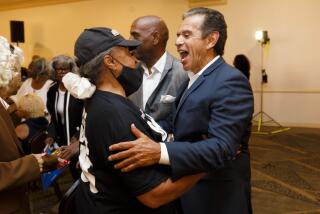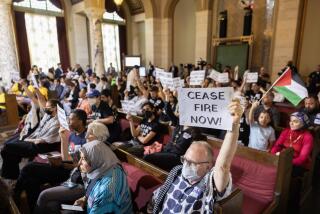Mayor joins mosque’s tribute to rights icon
Mayor Antonio Villaraigosa was the guest of honor Friday at a Los Angeles mosque. But it was the spirit of the Rev. Martin Luther King Jr. that held the crowd.
“King was a leader who gave his life working for justice,” said Muzammil H. Siddiqi, religious director of the Islamic Society of Orange County, in his sermon during Jumah, the weekly prayer service. “He stood for freedom, justice and equality among all. These are principles that we have to talk about as often as possible.”
Villaraigosa and his daughter Natalia attended the services on the 40th anniversary of the assassination of the civil rights leader and Christian pastor. His visit came about four months after the Los Angeles Police Department caused an outcry when plans for an extensive mapping program to identify Muslim enclaves across the city were revealed. At the time, police said the plan was needed to identify potential hotbeds of extremism.
Several Muslim leaders, including Shakeel Syed, executive director of the Islamic Shura Council of Southern California, which helped organize Friday’s service, condemned the project as an exercise in racial and religious profiling.
Police and city officials quickly scrapped the mapping part of the plan but said they would continue their efforts to reach out to the Muslim community.
On Friday, Villaraigosa and the Muslim leaders who invited him used the King anniversary and the visit to the mosque near USC as an opportunity to invoke the struggle for equality, unity and understanding.
Shortly before the service began, a trickle of men and women entered a prayer sanctuary known as the mussala, a large white room with high ceilings, arched windows and a blue carpet with yellow stripes. Adults, small children and university students removed their shoes as they entered. Some said prayers, others sat listening. A few toddlers crawled on the floor as mothers and fathers meditated in separate sections of the sanctuary.
The mayor, who earlier attended funeral services for Los Angeles firefighter Brent Allen Lovrien, arrived in the middle of Siddiqi’s sermon. Villaraigosa made his way to a seat at the front as Siddiqi asked congregants to reflect on what they’ve done to help further the freedoms gained in the civil rights struggle.
“We must ask ourselves,” he told the crowd, “what are we doing for freedom? What are we doing for justice?”
After the service, Douran Momand, 76, of Rancho Palos Verdes said African Americans’ struggle for equality and justice during the 1960s is the same struggle now faced by Muslims around the world.
When she first arrived in the United States from the Middle East in 1959 and was looking for a place to live, people at the university she was attending in Toledo, Ohio, advised her not to go into black neighborhoods.
“ ‘Don’t go around the blacks. Black people are bad,’ ” she said they told her. “They scared us to death. . . . Now they say that about Muslims.”
At a lunch with local leaders following the service, Villaraigosa noted the similarities that link many communities.
“I look more like you than I do the founding fathers of our great country,” he told the crowd. “Our ability to see that connection with one another is the key to our future.”
Then he too invoked the spirit of the civil rights movement.
“It is incumbent upon all of us to stand up against discrimination,” he said. “It is incumbent on us to stand up for those principles of Islamic faith -- equality, unity and diversity.”
--
More to Read
Sign up for Essential California
The most important California stories and recommendations in your inbox every morning.
You may occasionally receive promotional content from the Los Angeles Times.










